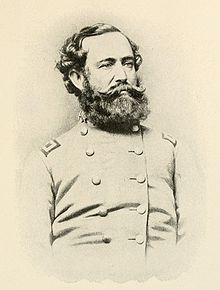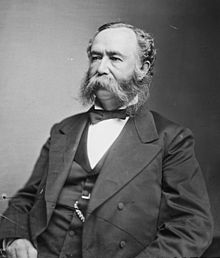----------------------------------------------------------------------------
Hampton was born in Charleston, SC and grew up in one of the wealthy families in the South, receiving private instruction. When his father died in 1858 his son inherited a vast fortune, the plantations, and one of the largest collections of slaves in the South.
Although his views were conservative concerning the issues of secession and slavery, and he had opposed the division of the Union as a legislator, at the start of the Civil War, Hampton was loyal to his home state. He resigned from the Senate and enlisted as a private in the South Carolina Militia; however, the governor of South Carolina insisted that Hampton accept a colonel's commission, even though he had no military experience at all. Hampton organized and partially financed the unit known as "Hampton's Legion", which consisted of six companies of infantry, four companies of cavalry, and one battery of artillery. He personally financed all of the weapons for the Legion.
Despite his lack of military experience and his relatively advanced age of 42, Hampton was a natural cavalryman—brave, audacious, and a superb horseman. He was one of only two officers without previous military experience (the other being Nathan Bedford Forrest) to achieve the rank of lieutenant general in the Confederate service. On May 23, 1862, Hampton was promoted to brigadier general while commanding a brigade in Stonewall Jackson's division in the Army of Northern Virginia.
Post War, Hampton was offered the nomination for governor in 1865, but refused because he felt that those in the North would be suspicious of a former Confederate general seeking political office only months after the end of the Civil War. However, he did become a leading fighter against Radical Republican Reconstruction policies in the South, and re-entered South Carolina politics in 1876 as the first southern gubernatorial candidate to run on a platform in opposition to Reconstruction. Hampton, a Democrat, ran against Radical Republican incumbent governor Daniel Chamberlain in Charleston. Supporters of Hampton were called the Red Shirts and were known to practice violence. Due to their crude reputation and hopes of alleviating Union suspicion, Hampton used Grace Piexotto's "The Big Brick House", a prominent brothel located at 11 Fulton Street, to assure complete privacy for the Red Shirts' meeting ground, which was mainly served as campaign headquarters.
The 1876 South Carolina gubernatorial election was one of the bloodiest (and closest) in the history of the state. Both parties claimed victory. For over six months, there were two legislatures in the state, both claiming to be authentic. Eventually, the South Carolina Supreme Court ruled Hampton was the winner of the election. President Rutherford B. Hayes stated that "the whole Army of the United States would be inadequate to enforce the authority of Gov. Chamberlain." Hayes then ordered the evacuation of Federal troops in South Carolina. Thus the election of the first Democrat in South Carolina since the end of the Civil War signified the end of Reconstruction in the South.
In 1890, Hampton's niece Caroline, an operating room nurse, married the father of American surgery, William Halsted. It was because of her skin reaction to surgical sterilization chemicals that Halsted invented the surgical glove the previous year.
Hampton died in Columbia in 1902 and is buried there in Trinity Cathedral Churchyard.
In Margaret Mitchell's novel, Gone With The Wind, Scarlet O'Hara's first husband, Charles Hamilton, served in Hampton's regiment, dying of measles only seven weeks later. As it was fashionable (according to Mitchell) to name baby boys after their fathers' commanding officers, Scarlett's son by Charles is therefore named Wade Hampton Hamilton.
In the North and South trilogy by John Jakes, the character Charles Main serves with Hampton's cavalry throughout the Civil War.




No comments:
Post a Comment